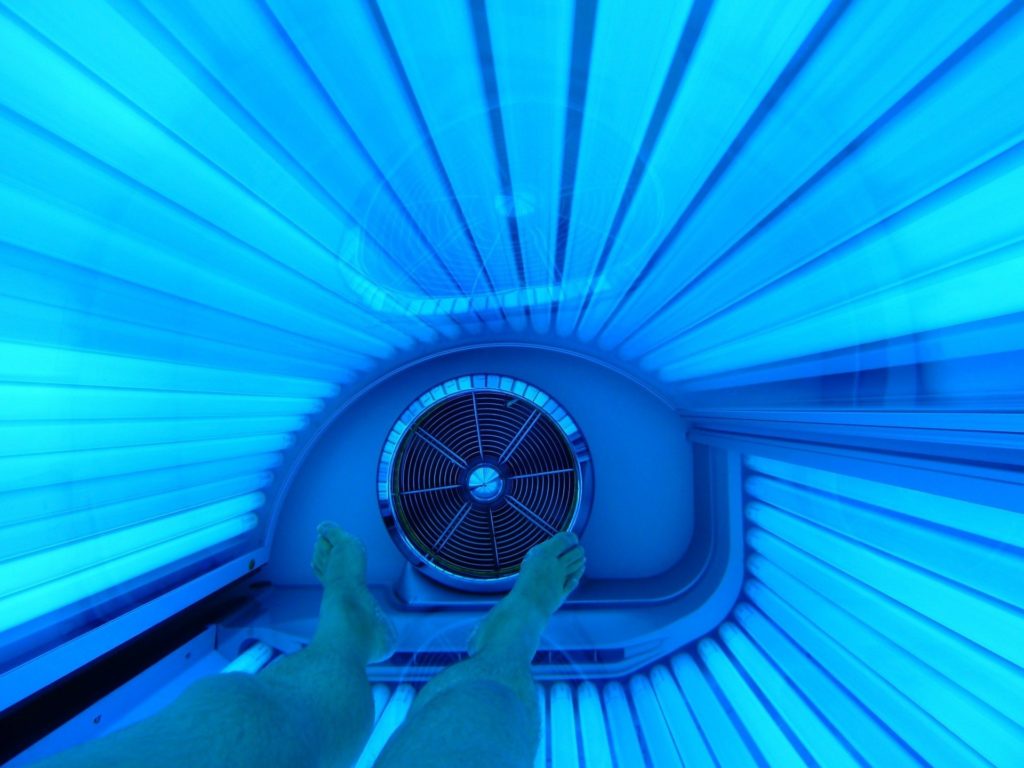
Researchers and healthcare professionals are always trying to figure out ways to decrease the number of people struggling with substance abuse. Part of this is understanding which people are more likely to start abusing drugs or alcohol.
A recent study found that often people who use tanning beds are more likely to do other risky or unhealthy behaviors [1]. People who use indoor tanning beds at least 12 times a year were more likely to smoke or drink large amounts of alcohol and caffeine [1].
The study also showed that these people were also more likely to have one or two addictive behaviors [2]. The connection between tanning and substance abuse isn’t fully understood. One interesting thing from the study is that they only studied women [1].
This may point to something that is going on with women societally. Indoor tanning is a way to alter someone’s appearance. There is a lot of emphasis in body-positive communities on increasing acceptance for different body shapes and sizes.
However, the beauty ideals in America extend beyond body shape and size. Tan skin is viewed as the most attractive skin tone. So, the link between tanning bed use and addictive behaviors may not be as random as it first appears to be.
Substance Abuse, Tanning, Possible Issues
 While research hasn’t confirmed this, the link between substance abuse and indoor tanning may point to the mental health issues that can come from body image insecurity. About 70% of girls and women report feeling dissatisfied with their appearance [2].
While research hasn’t confirmed this, the link between substance abuse and indoor tanning may point to the mental health issues that can come from body image insecurity. About 70% of girls and women report feeling dissatisfied with their appearance [2].
Body image insecurity can lead to mental health issues, like anxiety, depression, eating disorders, or substance abuse [2]. In fact, people who abuse substances are 11 times more likely to have an eating disorder compared to people who don’t [2].
Body Image, Caffeine, Alcohol
Given that negative body image can significantly contribute to the development of an eating disorder, the link between body image, substance abuse, and eating disorders is clear [2]. Some of the most commonly abused substances that people with eating disorders use are caffeine and alcohol [2].
Interestingly, these two substances are correlated with frequent indoor tanning use [1]! It may be helpful for women and girls to hear more body-positive messages about skin tone. If every shape and size is beautiful, then so is every skin tone. There is a lot of pressure on women and girls to look one specific way.
If this pressure is leading to mental health issues and physically harmful behaviors like addiction or indoor tanning, then something needs to change.
References:
[1] May, B. (2021, March 17). High indoor tanning frequency associated with heavier drinking, smoking, and more caffeine intake. Psychiatry Advisor. https://www.psychiatryadvisor.com/home/topics/addiction/indoor-tanning-tied-to-other-addictive-behaviors/
[2] National Eating Disorders Association. (2018). Statistics and research on eating disorders. https://www.nationaleatingdisorders.org/statistics-research-eating-disorders
About the Author:
 Samantha Bothwell, LMFT, is a licensed Marriage and Family Therapist, writer, explorer, and lipstick aficionado. She became a therapist after doing her own healing work so she could become whole after spending many years living with her mind and body disconnected. She has focused her clinical work to support the healing process of survivors of sexual violence and eating disorders. She is passionate about guiding people in their return to their truest Self so they can live their most authentic, peaceful life.
Samantha Bothwell, LMFT, is a licensed Marriage and Family Therapist, writer, explorer, and lipstick aficionado. She became a therapist after doing her own healing work so she could become whole after spending many years living with her mind and body disconnected. She has focused her clinical work to support the healing process of survivors of sexual violence and eating disorders. She is passionate about guiding people in their return to their truest Self so they can live their most authentic, peaceful life.
The opinions and views of our guest contributors are shared to provide a broad perspective of addictions. These are not necessarily the views of Addiction Hope, but an effort to offer a discussion of various issues by different concerned individuals.
We at Addiction Hope understand that addictions result from multiple physical, emotional, environmental, and genetic factors. If you or a loved one are suffering from an addiction, please know that there is hope for you, and seek immediate professional help.
Published on May 3, 2021
Reviewed by Jacquelyn Ekern, MS, LPC on May 3, 2021
Published on AddictionHope.com
